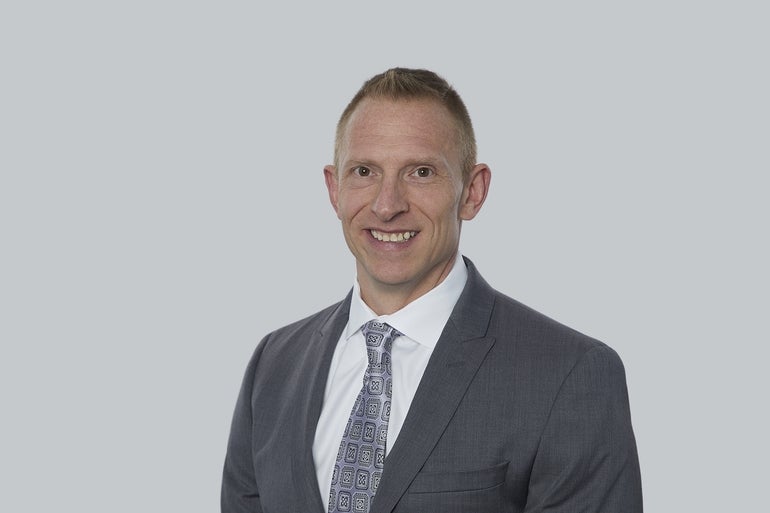Virginia-based contract research organization StageBio opened its new, 10,000-square-foot facility in Marlborough earlier this month. Founded while CEO Tom Galati was still in college, the company, which has offices in Maryland, works with clients to help bring their drugs and therapeutics to the marketplace through pre-clinical and clinical research. Prior to opening its Marlborough facility, the company spent three-years in a soft expansion phase by working out of Worcester incubator Massachusetts Biomedical Initiatives. For now, the new facility hosts 10 employees, although the company hopes to grow to about 50. This week, Galati spoke with WBJ about what it’s like growing a bioresearch company from the ground up, working on the scientific community’s response to the COVID-19 pandemic, and why he believed MetroWest was the best place to expand StageBio.
What does your involvement with the COVID-19 pandemic look like?
For us, COVID has taken what used to be just your general toxicologic pathology drug discovery and made it to where a lot of research dollars are going into, specifically, vaccinations and therapies around COVID. So we’re helping our clients to find novel approaches to bring therapies for COVID to market.
Does that include vaccine research?
Yes.
How does it feel to be involved in that right now?
One of our mottos of the company is: “Making the world a better place.” And so I feel like for a lot of our staff, it’s rewarding for them to be working on something that is life-changing and effects our families and our neighbors in the world around us. It’s rewarding to be a part of something effecting so many.
What differentiates your Massachusetts offices from your other locations?
So this is what we’re calling our Specialty Services Center of Excellence. Here, we will be diving deeper. What we do today is very much preclinical, meaning before people get to it. Here we are going to be doing more from the preclinical into what they call a translational science, and then into clinical research – so very much people-oriented.
A lot of molecular pathology — some things a little bit more specialized — will be done up here, primarily because there’s just such a need for it in the Boston/Cambridge/mid-Massachusetts area.
You’re in the biotech hub of the world, and to have all of the science and intelligence and innovation behind it, we really think this is a perfect place, a perfect opportunity, to grow our small team, and to really partner with biotech and pharma, and even academic and government and research institutions, to stake our claim.
What has it been like building a company over the course of two decades?
It’s been phenomenal. I started the company as a college student. I was working for another laboratory as a laboratory technician. I went in as an economics guy; I just happened to be working in a lab at the time. Being business-minded and entrepreneurial, I went to the owners of that lab and asked if I could take some of their clients and work with them on my own — some of the work they can’t make any money on, very small clients. And they said, “Sure, go ahead.” So I started the lab in my home. And it was literally a 10-by-10 bedroom in my house as a college kid. And so through the course of 21 years, we developed to where we are the largest contract histopathology lab in the country.
How did you make the jump from economics to lab science?
I just decided I had to do something I was good at. I was not a good student. And the only thing I was good at at the time, as a 22 year old, was this lab stuff. I knew how to be a lab technician because that’s how I had been putting myself through school. So I decided I need to see what it would look like to start my own laboratory. With $500 worth of equipment, literally, and a desk and a chair, this company was born.
So, at the moment you’re primarily preclinical. What does this expansion mean for the company?
Today we are, I would say, 80% preclinical. Making this push and diversifying our services into that clinical space allows our clients to have continuous experience with StageBio, and allows us to support their programs earlier and later. We are looking to allow our clients to get more data and deeper data from us, both on a quantifiable and qualifiable level. So that’s going to change the face of StageBio and, frankly, the face of science, because there’s very, very, very few contract research organizations who are going to be doing what we’ll be doing in a year from now.
What advice do you have for people who want to be entrepreneurial in the bioscience sphere?
I actually spend a fair amount of time mentoring young men and women in business because if I can do it, anybody on the planet can do it. It takes dedication, it takes awareness, and it takes a whole lot of hard work. It’s like anything else. You plan your work and work your plan.
The first thing I would say to someone is: Devise a plan on where you want to be, what you want to do, and then make it happen. Make attainable, bite-sized goals. Each and every day work towards those goals. Get your mind right, and get after it. That’s it. That’s all it is. You know, I’ve created a business my whole life; it’s not difficult. It’s not. It’s simple. It’s not easy, but you’ve got to have the right frame of mind to do it.
This interview was conducted and edited for length and clarity by WBJ Staff Writer Monica Busch.

